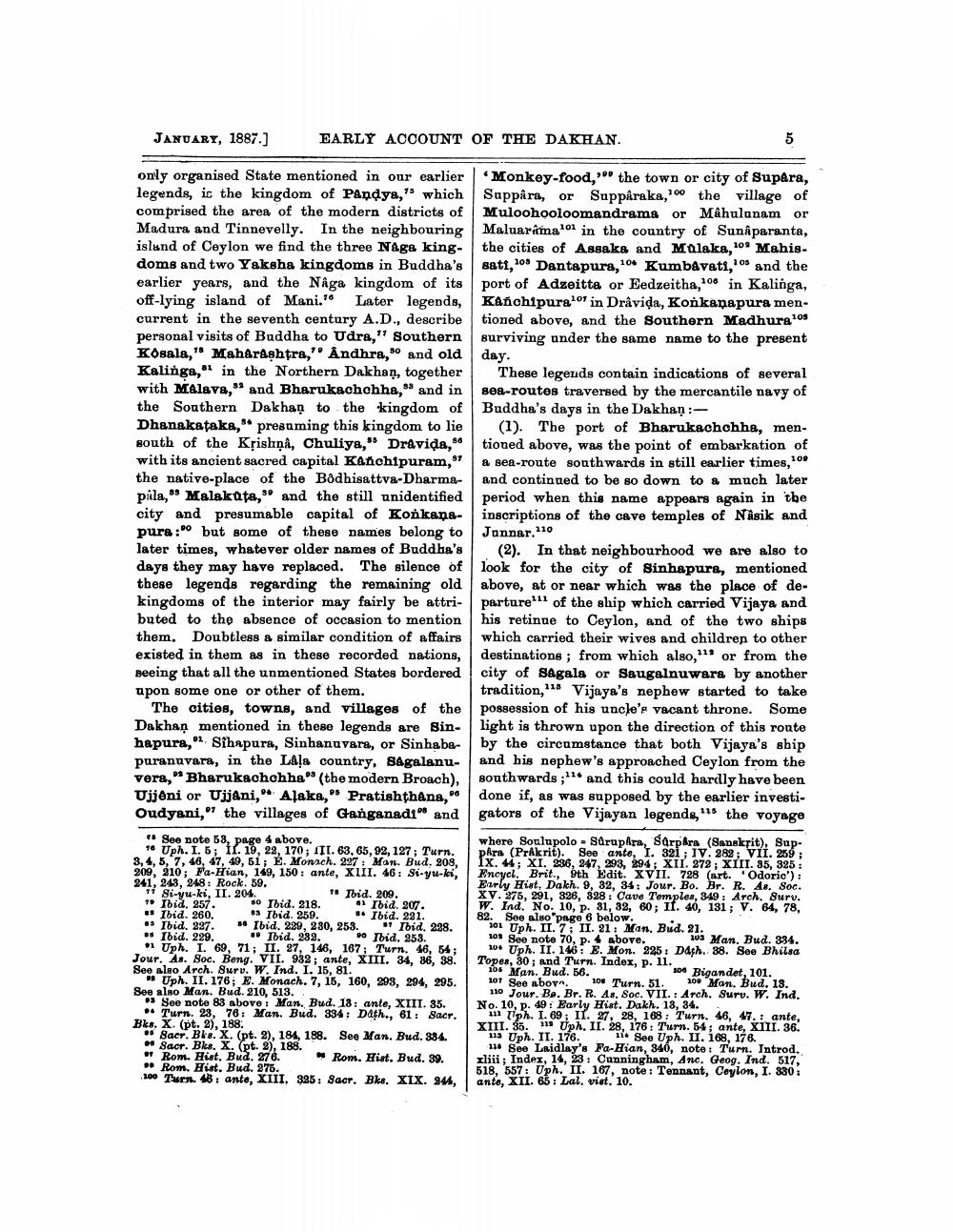________________
JANUARY, 1887.]
EARLY ACCOUNT OF THE DAKHAN.
only organised State mentioned in our earlier legends, ic the kingdom of Pandya," which comprised the area of the modern districts of Madura and Tinnevelly. In the neighbouring island of Ceylon we find the three Naga king doms and two Yaksha kingdoms in Buddha's earlier years, and the Naga kingdom of its off-lying island of Mani." Later legends, current in the seventh century A.D., describe personal visits of Buddha to Udra," Southern Kosala," Maharashtra," Andhra, and old Kalinga," in the Northern Dakhan, together with MAlava," and Bharukachchha," and in the Southern Dakhan to the kingdom of Dhanakataka," presuming this kingdom to lie south of the Kțishņâ, Chuliya," Dravida, with its ancient sacred capital Kanchipuram," the native-place of the Bodhisattva-Dharmapala," Malakata, and the still unidentified city and presumable capital of Koňkaņapura : but some of these names belong to later times, whatever older names of Buddha's days they may have replaced. The silence of these legends regarding the remaining old kingdoms of the interior may fairly be attri- buted to the absence of occasion to mention them. Doubtless a similar condition of affairs existed in them as in these recorded nations, Beeing that all the unmentioned States bordered upon some one or other of them.
The cities, towns, and villages of the Dakhan mentioned in these legends are Sinhapura, Sthapura, Sinhanuvara, or Sinhabapuranavara, in the Laļa country, Sagalanuvera, "Bharukachchhao (the modern Broach), Ujjeni or Ujjani, Alaka," Pratishthana, Oudyani," the villages of Ganganadi" and
Monkey-food,'" the town or city of Supara, Sappåra, or Suppåraka," the village of Muloohooloomandrama or Mâhulanam or Maluaramalol in the country of Sunâparanta, the cities of Assaka and Malaka, Mahis. sati, 10 Dantapura, 10* Kumbavati,os and the port of Adzeitta or Eedzeitha, in Kalinga, Kanchipura'' in Drâvida, Konkanapura mentioned above, and the Southern Madhura10 surviving under the same name to the present day.
These legends contain indications of several sea-routes traversed by the mercantile navy of Buddha's days in the Dakhan:
(1). The port of Bharukachchha, mentioned above, was the point of embarkation of a sea-route southwards in still earlier times, and continued to be so down to a much later period when this name appears again in the inscriptions of the cave temples of Nasik and Jannar. 110
(2). In that neighbourhood we are also to look for the city of Sinhapura, mentioned above, at or near which was the place of departure of the ship which carried Vijaya and his retinue to Ceylon, and of the two ships which carried their wives and children to other destinations ; from which also," or from the city of sagala or Saugalnuwara by another tradition,"18 Vijaya's nephew started to take possession of his uncle'e vacant throne. Some light is thrown upon the direction of this route by the circumstance that both Vijaya's ship and his nephew's approached Ceylon from the southwards ;" * and this could hardly have been done if, as was supposed by the earlier investigators of the Vijayan legends, "" the voyage where Soulupolo - Sarapkra, Sarpkra (Sanskrit), Sap. para (Prakrit). See ante, I. 321 ; IV. 282; VII. 259; 1x. 44; XI. 236, 247, 293, 294; XII. 372, XIII. 35, 325 Encycl. Brit., 9th Edit. XVII. 728 art. 'Odoric') : Early Hist, Dakh. 9, 32, 34: Jour. Bo. Br. R. As. Soc. XV. 275, 291, 826, 328: Cave Temples, 349Arch. Suru. W. Ind. No. 10, p. 31, 32, 60; If. 46, 131; V. 64, 78, 82. See also page 6 below. _
201 Uph. II. 7; II. 21. Man. Bud. 21. 103 See note 70, p. 4 above.
18 Man. Bud. 334. 10+ Uph. II. 146: E. Mon. 225: Dash. 88. See Bhilsa Topes, 30; and Turn. Index, p. 11. 20s Man. Bud. 56.
I Bigandet, 101. 107 See abova. 109 Turn. 51. 200 Man. Bud. 13.
110 Jour. Bp. Br. R. As. Soc. VII. : Arch. Suru. W. Ind. No. 10, p. 49: Early Hist. Dakh. 18, 34.
mu t'ph. 1. 69; II. 27, 28, 168 : Turn. 46, 47. : ante, XIII. 35. Uph. II. 28, 176: Turn. 54; ante, XIII. 36.
113 Uph. II. 176. 1. See Uph. II. 168, 176.
116 See Laidlay's Fa-Hian, 846, note: Turn. Introd. xliii; Index, 14, 23: Cunningham, Anc. Geog. Ind. 517, 518, 557: Uph. II. 167, note: Tennant, Ceylon, I. 830 ante, XII. 65: Lal. viet. 10.
** See note 53, page 4 above.
** Uph. I. 5; 11. 19, 22, 170; II. 63, 65, 92, 127; Turn. 3, 4, 5, 7, 46, 47, 49, 51; E. Monsch. 227 : Man. Bud. 208, 209, 210; Fa-Hian, 149, 150 : ante, XIII. 46: Si-yu-ki, 241, 243, 248: Rock. 59. 11 Si-yu-ki, II. 204.
* Ibid. 200. 1 Ibid. 257. 10 Ibid. 218. Ibid. 207. . Ibid. 260.
Ibid. 259. . Ibid. 221. • Ibid. 327. Ibid. 229, 230, 253. Toid. 228. • Tbid. 229. • Ibid. 239.
Ibid. 253. • Uph. I. 69, 71; II. 27, 146, 167; Turn. 46, 54; Jour. As. Soc. Beng. VII. 932; ante, XIII. 34, 36, 38. See also Arch. Suru. W. Ind. I. 15, 81.
* Uph. II. 176; E. Monach. 7, 16, 160, 293, 294, 295. See also Man. Bud. 210, 513.
• See note 83 above: Man. Bud. 18: ante, XIII. 35.
• Turn. 23, 76: Man. Bud. 834: Dath., 61: Sacr. Bks, X. (pt. 2), 188
• Sacr. Bk8. x. (pt. 2), 184, 188. See Man. Bud. 334. . Sacr. Bks, X. (pt. 2), 188. Rom. Hist. Bud. 276.
Rom. Hist. Bud. 39. * Rom. Hist. Bud. 375. 2,00 Turn. 18. ante, XIII, 325: Sacr. Bks. XIX. 944,




